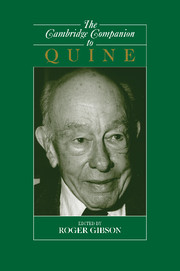Book contents
- Frontmatter
- Willard Van Orman Quine
- 1 Aspects of Quine’s Naturalized Epistemology
- 2 Quine on the Intelligibility and Relevance of Analyticity
- 3 Quine’s Meaning Holisms
- 4 Underdetermination of Physical Theory
- 5 Quine on Reference and Ontology
- 6 Indeterminacy of Translation
- 7 Quine’s Behaviorism cum Empiricism
- 8 Quine on Modality
- 9 Quine and Logical Positivism
- 10 Quine and Logic
- 11 Quine on Quine
- Selected Bibliography
- Index
4 - Underdetermination of Physical Theory
Published online by Cambridge University Press: 28 May 2006
- Frontmatter
- Willard Van Orman Quine
- 1 Aspects of Quine’s Naturalized Epistemology
- 2 Quine on the Intelligibility and Relevance of Analyticity
- 3 Quine’s Meaning Holisms
- 4 Underdetermination of Physical Theory
- 5 Quine on Reference and Ontology
- 6 Indeterminacy of Translation
- 7 Quine’s Behaviorism cum Empiricism
- 8 Quine on Modality
- 9 Quine and Logical Positivism
- 10 Quine and Logic
- 11 Quine on Quine
- Selected Bibliography
- Index
Summary
INTRODUCTION
Our theories of the world are related in various ways to experience. We construct theories partly in order to account for what we have observed and partly in order to systematize and support our expectations for future experience. But what we experience is not sufficient to determine our theories. Different theories may account for our observations equally well. This, roughly speaking, is the thesis that physical theory is underdetermined. W.V. Quine has formulated the idea in different ways in different contexts.
However, before we consider Quine’s formulations, let us look at the following passage from an address delivered by Albert Einstein on the occasion of Max Planck’s sixtieth birthday in 1918:
The supreme task of the physicist is to arrive at those universal elementary laws from which the cosmos can be built up by pure deduction. There is no logical path to these laws; only intuition, resting on sympathetic understanding of experience, can reach them. In this methodological uncertainty, one might suppose that there were any number of possible systems of theoretical physics all equally well justified; and this opinion is no doubt correct, theoretically. But the development of physics has shown that at any given moment, out of all conceivable constructions, a single one has always proved itself decidedly superior to all the rest. Nobody who has gone deeply into the matter will deny that in practice the world of phenomena uniquely determines the theoretical system, in spite of the fact that there is no logical bridge between phenomena and their theoretical principals.
Information
- Type
- Chapter
- Information
- The Cambridge Companion to Quine , pp. 91 - 114Publisher: Cambridge University PressPrint publication year: 2004
Accessibility standard: Unknown
Why this information is here
This section outlines the accessibility features of this content - including support for screen readers, full keyboard navigation and high-contrast display options. This may not be relevant for you.Accessibility Information
- 6
- Cited by
